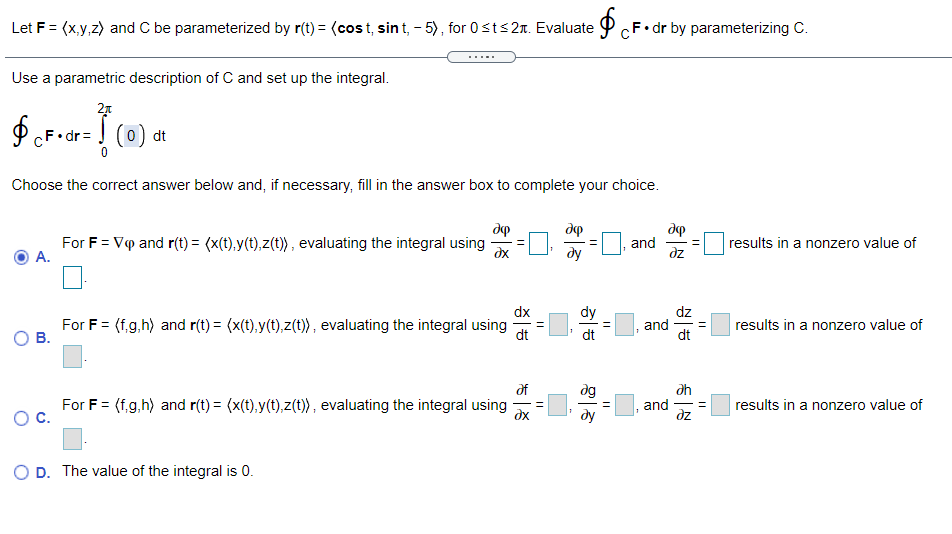Let F = (x,y,z) and C be parameterized by r(t) = (cos t, sin t, - 5), for 0sts2n. Evaluate cF•dr by parameterizing C. Use a parametric description of C and set up the integral. P CF•dr= ! (0) dt Choose the correct answer below and, if necessary, fill in the answer box to complete your choice. For F= Vo and r(t) = (x(t),y(t),z(t), evaluating the integral using А. and dz results in a nonzero value of ду dx dy For F = (f,g,h) and r(t) = (x(t),y(t),z(t)), evaluating the integral using dt dz and dt results in a nonzero value of В. dt of dg dh For F = (f.g,h) and r(t) = (x(t),y(t),z(t)), evaluating the integral using C. and dz results in a nonzero value of дх ду O D. The value of the integral is 0. ||
Let F = (x,y,z) and C be parameterized by r(t) = (cos t, sin t, - 5), for 0sts2n. Evaluate cF•dr by parameterizing C. Use a parametric description of C and set up the integral. P CF•dr= ! (0) dt Choose the correct answer below and, if necessary, fill in the answer box to complete your choice. For F= Vo and r(t) = (x(t),y(t),z(t), evaluating the integral using А. and dz results in a nonzero value of ду dx dy For F = (f,g,h) and r(t) = (x(t),y(t),z(t)), evaluating the integral using dt dz and dt results in a nonzero value of В. dt of dg dh For F = (f.g,h) and r(t) = (x(t),y(t),z(t)), evaluating the integral using C. and dz results in a nonzero value of дх ду O D. The value of the integral is 0. ||
Calculus: Early Transcendentals
8th Edition
ISBN:9781285741550
Author:James Stewart
Publisher:James Stewart
Chapter1: Functions And Models
Section: Chapter Questions
Problem 1RCC: (a) What is a function? What are its domain and range? (b) What is the graph of a function? (c) How...
Related questions
Question

Transcribed Image Text:Let F = (x,y,z) and C be parameterized by r(t) = (cos t, sin t, - 5), for 0sts2n. Evaluate
cF•dr by parameterizing C.
Use a parametric description of C and set up the integral.
P CF•dr= ! (0) dt
Choose the correct answer below and, if necessary, fill in the answer box to complete your choice.
For F= Vo and r(t) = (x(t),y(t),z(t), evaluating the integral using
А.
and
dz
results in a nonzero value of
ду
dx
dy
For F = (f,g,h) and r(t) = (x(t),y(t),z(t)), evaluating the integral using
dt
dz
and
dt
results in a nonzero value of
В.
dt
of
dg
dh
For F = (f.g,h) and r(t) = (x(t),y(t),z(t)), evaluating the integral using
C.
and
dz
results in a nonzero value of
дх
ду
O D. The value of the integral is 0.
||
Expert Solution
This question has been solved!
Explore an expertly crafted, step-by-step solution for a thorough understanding of key concepts.
This is a popular solution!
Trending now
This is a popular solution!
Step by step
Solved in 2 steps with 1 images

Recommended textbooks for you

Calculus: Early Transcendentals
Calculus
ISBN:
9781285741550
Author:
James Stewart
Publisher:
Cengage Learning

Thomas' Calculus (14th Edition)
Calculus
ISBN:
9780134438986
Author:
Joel R. Hass, Christopher E. Heil, Maurice D. Weir
Publisher:
PEARSON

Calculus: Early Transcendentals (3rd Edition)
Calculus
ISBN:
9780134763644
Author:
William L. Briggs, Lyle Cochran, Bernard Gillett, Eric Schulz
Publisher:
PEARSON

Calculus: Early Transcendentals
Calculus
ISBN:
9781285741550
Author:
James Stewart
Publisher:
Cengage Learning

Thomas' Calculus (14th Edition)
Calculus
ISBN:
9780134438986
Author:
Joel R. Hass, Christopher E. Heil, Maurice D. Weir
Publisher:
PEARSON

Calculus: Early Transcendentals (3rd Edition)
Calculus
ISBN:
9780134763644
Author:
William L. Briggs, Lyle Cochran, Bernard Gillett, Eric Schulz
Publisher:
PEARSON

Calculus: Early Transcendentals
Calculus
ISBN:
9781319050740
Author:
Jon Rogawski, Colin Adams, Robert Franzosa
Publisher:
W. H. Freeman


Calculus: Early Transcendental Functions
Calculus
ISBN:
9781337552516
Author:
Ron Larson, Bruce H. Edwards
Publisher:
Cengage Learning